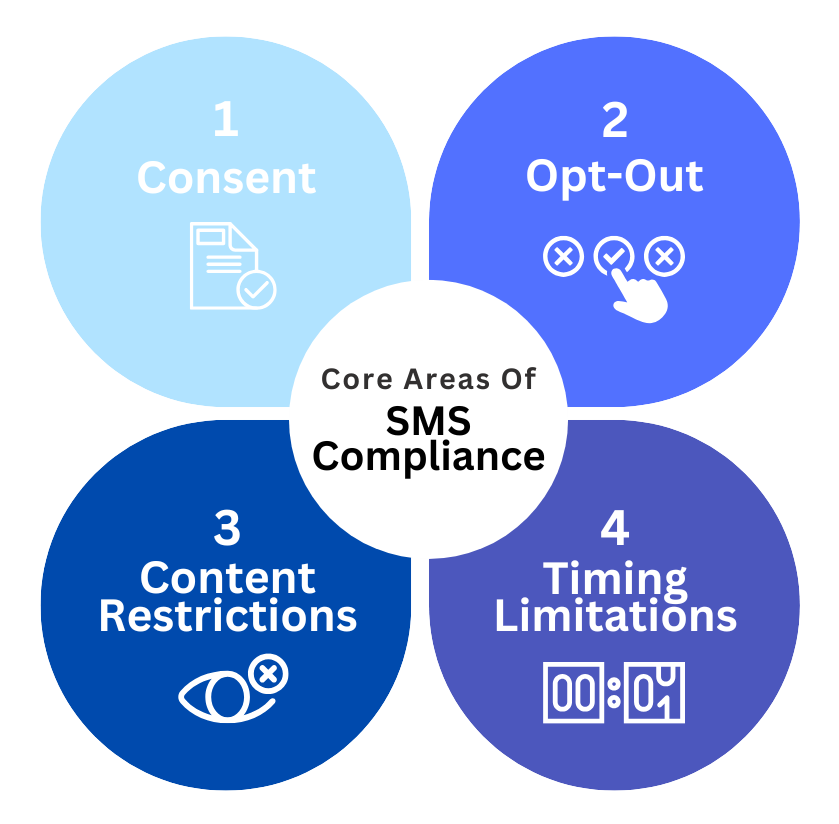Introduction
SMS marketing regulations is a powerful channel for connecting with customers worldwide due to its high open rates and direct reach. However, every country has its own regulations, and non-compliance can result in severe fines, message blocks, or even legal repercussions. This guide provides a comprehensive look at the SMS marketing regulations in major global markets, with actionable tips to help you create compliant and effective campaigns.
1. Understanding Global SMS Compliance Requirements

SMS compliance rules focus on these core areas:
- Consent: Obtaining explicit consent is mandatory in most countries, but the level (single or double opt-in) varies.
- Opt-Out: Marketers must provide a straightforward way for recipients to unsubscribe.
- Content Restrictions: Some countries prohibit specific content, such as adult, political, or gambling-related topics.
- Timing Limitations: Many regions restrict SMS marketing to specific hours to avoid disturbing recipients.
2. Country-Specific Regulations and Compliance Tips
United States
- Regulations: TCPA (Telephone Consumer Protection Act), CTIA Guidelines.
- Key Requirements:
- Prior Consent: Written consent is mandatory for marketing messages.
- Message Timing: Messages should only be sent between 8 AM and 9 PM in the recipient’s time zone.
- Content Restrictions: Prohibited content includes gambling, adult material, and certain financial services.
- A2P Messaging: Register all Application-to-Person (A2P) messaging campaigns with U.S. carriers for pre-approval.
- Opt-Out Protocol: Provide clear opt-out instructions, typically by replying with “STOP.”
Canada
- Regulations: Canadian Anti-Spam Legislation (CASL).
- Key Requirements:
- Explicit Consent: Consent must be explicit and documented.
- Opt-Out Mechanism: Include an easy opt-out option (e.g., “STOP”).
- Content Restrictions: High-risk financial services are restricted, and international shortcodes may be replaced by local sender IDs.
- Record-Keeping: Keep consent records to demonstrate compliance if requested.
European Union
- Regulations: GDPR, ePrivacy Directive.
- Key Requirements:
- Double Opt-In: Often recommended to validate consent.
- Data Rights: Consumers can request access to or deletion of their data.
- Content Restrictions: Political and adult content may be restricted in certain countries.
- Messaging Hours: Some countries (e.g., France) restrict messages on Sundays and outside business hours.
- Opt-Out: Always include opt-out instructions for recipients.
United Kingdom
- Regulations: GDPR (post-Brexit), Privacy and Electronic Communications Regulations (PECR).
- Key Requirements:
- Consent Requirement: Obtain opt-in consent for all marketing messages.
- Transparency: Clearly communicate the type and frequency of messages.
- Content Restrictions: Limit aggressive financial offers and include an opt-out option in each message.
- Data Rights: Respect data access and deletion rights as per GDPR standards.
India
- Regulations: Telecom Regulatory Authority of India (TRAI) guidelines.
- Key Requirements:
- DLT Platform: Register SMS campaigns on the Distributed Ledger Technology (DLT) platform.
- Timing: Promotional messages are only allowed between 9 AM and 9 PM.
- Sender ID Registration: Sender IDs must be registered with TRAI.
- Content Restrictions: Prohibits promotion of illegal substances; consent is required for all transactional and promotional messages.
Australia and New Zealand
- Australia’s Regulations: Spam Act 2003.
- New Zealand’s Regulations: Unsolicited Electronic Messages Act.
- Key Requirements:
- Consent: Consent is required for all commercial messages.
- Opt-Out: Messages must provide a simple opt-out option.
- Timing: Avoid sending messages outside of 8 AM to 8 PM.
- Local Sender IDs: Use local sender IDs for international campaigns to improve delivery.
China
- Regulations: Ministry of Industry and Information Technology (MIIT).
- Key Requirements:
- Content Censorship: Strict content guidelines apply, especially regarding political and religious topics.
- Local Gateways: Use local SMS gateways for delivery, as international IDs may be converted to local numeric codes.
- Registration: Register campaigns in advance to comply with filtering standards.
- Message Frequency: Follow local frequency limits to prevent excessive marketing.
Brazil
- Regulations: ANATEL (Brazilian National Telecommunications Agency) rules.
- Key Requirements:
- Transparency: All promotional messages must clearly state the sender.
- Content Restrictions: Political and adult content are heavily regulated.
- Opt-Out Mechanism: Include a straightforward opt-out option.
- Sender Identification: International campaigns should use approved sender IDs to avoid blocking.
Middle Eastern Countries (e.g., Saudi Arabia, UAE)
- Regulations: Country-specific regulations based on cultural and religious sensitivities.
- Key Requirements:
- Pre-Approval: Register and pre-approve content for marketing or promotional campaigns.
- Content Restrictions: Political and religious messaging is often prohibited.
- Local IDs: Many countries require the use of local sender IDs to ensure compliance.
- Timing Rules: Messages should align with local cultural norms, respecting religious days and prayer times.
Japan
- Regulations: Telecommunications Business Act.
- Key Requirements:
- Opt-Out Options: All messages must include an opt-out link or keyword.
- Content Restrictions: Gambling and certain financial promotions are restricted.
- Frequency Limits: Limit message frequency to avoid consumer complaints and spam allegations.
- Consent: Obtain express consent from recipients before sending marketing messages.
3. Best Practices for SMS Marketing Compliance
To ensure a compliant SMS marketing campaign, follow these best practices across all countries:

- Double Opt-In: Use a double opt-in process to verify consent, especially in regions like the EU where stricter data regulations apply.
- Clear Opt-Out Instructions: Every message should include a simple, clear way for recipients to unsubscribe.
- Data Retention: Retain consent records, including timestamps, the consent source, and any actions related to consent.
- Transparent Messaging: Disclose what types of messages recipients will receive, the frequency, and the sender’s identity.
- Adapt to Local Rules: Always adjust timing and content based on local regulations to avoid compliance issues.
4. Using Compliance Tools and Technology
Utilize CRM Messaging tools that offer compliance features, such as:
- Automated Opt-Out Management: Ensures recipients who unsubscribe are removed from the list automatically.
- Time Zone Management: Sends messages only during permissible hours in the recipient’s local time.
- Consent Records: Tracks and stores consent details, helping to streamline compliance verification.
- Content Filtering: Scans for prohibited words or phrases to prevent message blocking.
5. Staying Updated with Regulatory Changes
SMS marketing regulations are constantly evolving. Here’s how to keep up:
- Consult Legal Experts: A legal expert specializing in electronic communications can provide tailored guidance for international campaigns.
- Subscribe to Industry Newsletters: Staying informed about changes in digital marketing and telecommunications regulations can help you remain compliant.
- Review Compliance Regularly: Regularly audit your SMS marketing program to ensure it meets current regulatory standards.
Conclusion
By adhering to SMS marketing regulations, you not only avoid penalties but also build customer trust and enhance your brand reputation. When planning global SMS campaigns, be mindful of each country’s unique rules and use tools that help automate compliance management. With a well-informed approach, you can make your SMS marketing campaigns both effective and compliant, driving engagement and growth worldwide.
CRM Messaging ensures that your campaigns comply with all the necessary requirements, so that you connect with your customers efficiently and effectively. Get in touch with our experts today to learn more: Book A Demo Here






